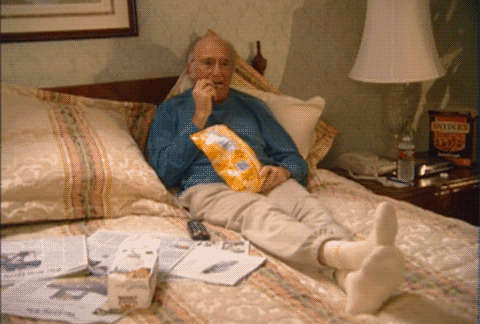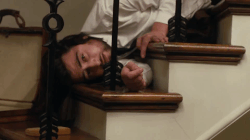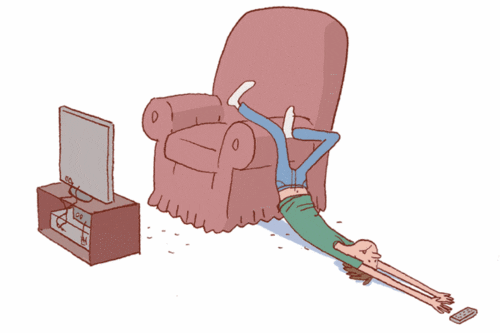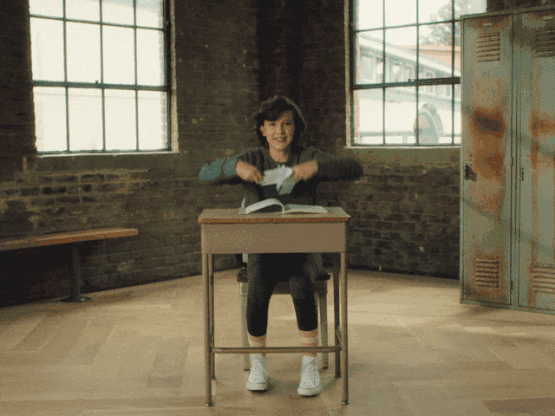You have to deliver work tomorrow morning, and you create a new word document.
Staring at the blank page, you suddenly start to think: Is it time to sweep the floor at home? Should the clothes be washed too? Haven’t cut your nails for a long time? After cutting, take a shower and wake up, I will start immediately! After drying your hair, you lie in bed and watch dozens of boring TikTok videos.
I looked at the watch and it was almost 11 o’clock.
You think to yourself: go to bed early, and finish the work well tomorrow morning. But I don’t need to tell you, you know what’s going to happen the next morning .

Figure | giphy
Procrastination like this always occurs repeatedly, and you may be wondering in your heart: Why? Why can’t I control myself to keep procrastinating even though I know the work is too much to finish?
According to the traditional understanding of procrastination, psychologists will say that you have a problem with “time management”: you don’t have a clear understanding of how long the work you are about to deliver will take, and you don’t have strict control Time wasted on other things.

Today is the deadline, but I just don’t remember | giphy
This is what most people think when they procrastinate: My time management skills are terrible! Why can’t I focus like everyone else? It must be my lack of willpower.
But the latest theory suggests that procrastination is not a “time management” problem, but an “emotional regulation” problem. People who often procrastinate are more likely to choose to escape when they are not in a good mood.
To procrastinate is to avoid what you are about to do
unpleasant emotions
One study found that students who procrastinated more easily had lower levels of “psychological flexibility.” Mental flexibility refers to a person’s ability to tolerate uncomfortable thoughts and moods . People with high psychological flexibility can insist on completing things that serve longer-term goals first, even in the presence of certain interference. In other words, people who are prone to procrastination are more likely to be dominated by psychological reactions such as frustration and worry.
The less flexible students were, the more likely they were to agree with statements like “I’m afraid of how I feel,” “Painful experiences and memories make it hard for me to live the life I approve of.” People who often procrastinate, it is difficult to actively continue to take action towards the goal, they will be more likely to agree that “if I feel frustrated or discouraged, I will not care about my task”.

Figure | giphy
Joseph Ferrari, a professor of psychology at DePaul University in the United States, told the journal Psychological Science that procrastination generally occurs for two basic reasons:
(1) Procrastinators feel that their current emotions are not suitable for completing tasks
(2) Procrastinators believe that if they procrastinate for a while, they will feel better afterwards
When we think, “I’ll sleep first, I’ll definitely be able to focus more later,” we’re actually avoiding tasks that might make us feel less happy, and instead choosing to do something that can temporarily improve our mood. But this not only does not allow us to achieve our goals better, but it will make us fall into a vicious circle of procrastination.

Don’t use “the dog won’t let me get up” as an excuse, okay | giphy
Procrastinating on completing an important task can make us feel anxious, guilty, and even ashamed , and in this state, we don’t have enough emotional and cognitive capacity to be productive . As a result, we feel more guilty, become less productive, and get caught in a cycle of more frustration over and over again.
This is why procrastination is fundamentally the wrong emotion-regulation strategy: while it may bring you short-term relief, the problems just keep piling up .
The first step in alleviating procrastination,
is to forgive and understand yourself
If we want to alleviate procrastination, we must recognize that procrastination is an emotional problem rather than a productivity problem. Downloading a time-management app, or learning a new self-discipline technique , doesn’t solve the problem at its root . We must find a new way to manage our emotions.
Traditional Cognitive Behavioral Therapy (CBT: Cognitive Behavioral Therapy) likes to solve problems by directly challenging and changing bad cognitions and behaviors. But research shows that another form of acceptance and commitment therapy (ACT: Acceptance and Commitment Therapy) is more effective in the long run than cognitive behavioral therapy.

Accept your procrastination | giphy
ACT does not teach people how to better control and eliminate bad thoughts like CBT, but people just “observe” and try to accept and embrace all their current feelings, whether they are positive or not. Its core is to help people jump out of themselves, observe and perceive the body and mind from a perspective other than themselves, and then improve their psychological flexibility.
The core of ACT is to forgive, accept and understand yourself, and this is an important first step in alleviating procrastination. You know, procrastination is the norm that exists in almost everyone, and there are very few people who never procrastinate.
According to Ronald Leprohon, an Egyptologist at the University of Toronto, ancient Egyptians were plagued by delays as early as 1400 B.C. Some hieroglyphs read: “My friend, do not delay your work any longer. , let’s go home early.”
The brilliant writer Douglas Adams, creator of The Hitchhiker’s Guide to the Galaxy, was struggling to meet the deadline for his new book. Forced to do nothing, his editor booked a hotel and stared at him typing every day, and Adams finally finished the manuscript a few weeks later.

Celebrities procrastinate too | giphy
The results of a study showed that 32% of college students were serious procrastinators, and only 1% said they never procrastinated .
In addition, there have been quite a lot of research in the field of psychology on the introspection and self-blame that people have after procrastination. Most studies have found that our obsession with procrastination can fuel anxiety and stress, leading to further procrastination .
In a 2010 study, researchers found that students who forgave themselves for procrastinating before their first test ended up procrastinating less before their next test. These self-forgiving students, instead of dwelling on the burden of bad behavior from the past, focused on their upcoming exams and ended up doing well.

Figure | giphy
In a 2012 study, Fuschia Sirois, professor of psychology at the University of Sheffield, looked at the relationship between stress, self-compassion and procrastination. He found that procrastinators were often high stressors and low self-compassion . The so-called self-compassion is the ability to understand one’s own mistakes and failures and treat oneself with tolerance.
The next time your productivity lets you down, stop blaming yourself and try to understand yourself : Remind yourself that procrastination is normal as a human being, everyone procrastinates sometimes, and try again Do some planning and let the work slowly catch up to your expectations.
There are two ways to procrastinate
may wish to try
Cut down on distractions
In the early 21st century, researchers at Case Western Reserve University in the United States let some subjects read sad stories, and then they found that the subjects who were in a bad mood did not immediately start preparing for the subsequent intelligence test, but began to procrastinate. , to play puzzles or play games. And only when the subjects believed that these things would make them happy, depressed mood caused procrastination . That is, if you don’t think doing puzzles or playing games will make you happy, you won’t procrastinate because you are in a bad mood.
So one approach is to try to put some barriers between us and the immediate temptations around us . If you often can’t restrain yourself from swiping social media, just delete these apps directly, or set a particularly complicated and long password for your phone. Add resistance to procrastination and make the rewards of these temptations less immediate.
Psychologist Piers Steel’s team at the University of Calgary in Canada designed an app that adds a bit of a delay to the lure of the phone: When you click on a game, the phone doesn’t directly click on it. Start the game, but instead display a countdown and ask you, “Do you really want to play the game?”.
This small delay is enough to prompt us to reconsider our choices.
Start with the easiest little things, and it will be much better after that
The fundamental reason why procrastination is so hard to overcome is that procrastinators are being given a quick, immediate reward every time they escape a task and choose another pleasurable option ; More likely to do it again.
Professor Ferrari said, “Saying things like ‘just do it’ and ‘today’s work is over’ to a person who has been procrastinating for a long time is like saying to a patient diagnosed with depression, ‘Be happy!” the same.”
In order to solve this problem, we can first find a way to “cheat” the brain. A study found that when procrastinators don’t view a task as work, they are more likely to finish it as quickly as possible . In the study, students were asked to complete a puzzle, but before doing so, they were given a few minutes to choose to play Tetris first. The students who procrastinated frequently procrastinated only when the researchers presented the puzzle task as a cognitive test. When the researchers described the puzzle task as a game, even the students who procrastinated frequently started as quickly as the others.
So, try telling yourself: “I’m not really going to do this right now, I’m just going to open the file and take some notes.” First “cheat” your brain and turn the task into a game, an adventure , a pastime, let yourself start from the simplest first step, and slowly enter the state.
Ask yourself directly: What is the easiest next step?
As Dr. Piers Steele says, doing a job is like jumping into a cold pool. It can be intimidating for a few seconds, but soon the body gets used to it. “Although I feel that the current state is not good enough, I will start directly like this.”
So you who see this, find a clear, simple, and small action for yourself, no matter how you feel, try it first!

Figure | giphy
references
[1]Sirois, F., & Pychyl, T. (2016). Procrastination, health, and well-being . Academic Press.
[2] Eisenbeck, N., Carreno, D., & Ucles-Juarez, R. (2019). From psychological distress to academic procrastination: Exploring the role of psychological inflexibility. (Report) (Author abstract). Journal of Contextual Behavioral Science, 13, 103–108. https://ift.tt/PemhuwB
[3]Wang, S., Zhou, Y., Yu, S., Ran, L., Liu, X., Chen, Y., Chan, C., & Holosko, M. (2017). Acceptance and Commitment Therapy and Cognitive–Behavioral Therapy as Treatments for Academic Procrastination: A Randomized Controlled Group Session. Research on Social Work Practice, 27(1), 48–58. https://ift.tt/IqHcd2f
[4]Wohl, M., Pychyl, T., & Bennett, S. (2010). I forgive myself, now I can study: How self-forgiveness for procrastinating can reduce future procrastination. Personality and Individual Differences, 48(7 ), 803–808. https://ift.tt/pT1Cel7
[5] Sirois, F. (2014). Procrastination and Stress: Exploring the Role of Self-compassion. Self and Identity, 13(2), 128–145. https://ift.tt/QstqAzi
[6]Sirois, F. and Pychyl, T. (2013) Procrastination and the Priority of Short-Term Mood Regulation: Consequences for Future Self. Social and Personality Psychology Compass, 7 (2). 115 – 127. ISSN 1751-9004
[7] The Procrastination Doom Loop—and How to Break It, DEREK THOMPSON, https://ift.tt/mDYqg6L
[8]Why procrastination is about managing emotions, not time, Christian Jarrett, https://ift.tt/HBDGRuW
[9] Why You Procrastinate (It Has Nothing to Do With Self-Control), Charlotte Lieberman, https://ift.tt/glo8s3K
[10] Procrastinate Much? Manage Your Emotions, Not Your Time, Adam Grant, https://ift.tt/hwprekY
[11] Why your brain loves procrastination, Susannah Locke, https://ift.tt/zGBxlq3
[12] Confront your fears … and four other ways to stop procrastinating, Elle Hunt, https://ift.tt/RmgyMBc
[13] Put off procrastinating… forever! Tips on how to be more productive, Graham Allcott, https://ift.tt/5LUI0SN
Author: Carcosa
Edit: Yakumo
an AI
People who often procrastinate may even procrastinate on “starting to overcome procrastination”

A green comet numbered C/2022 E3 is approaching the earth. The last time the earth looked at her was 50,000 years ago, when Homo sapiens and Neanderthals looked up at the same starry sky together. Today, we are lucky enough to see her again. Tonight (February 1) at 17:00, Han Yueyang, an astronomy expert, will take everyone to observe this green comet and tell you wonderful knowledge about comets! The live broadcast portal below, hurry up and make an appointment~

This article comes from Guoke, and shall not be reproduced without authorization.
If necessary, please contact [email protected]

This article is transferred from: http://www.guokr.com/article/463360/
This site is only for collection, and the copyright belongs to the original author.